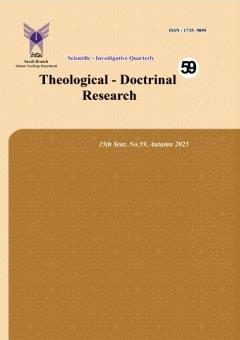A Phenomenographic Study of Contradictions between Dispute Resolutions in Islam and International Law: Comparing Arbitration in Shiite Jurisprudence
Subject Areas : Islamic theologyMasoud Sheibak 1 , Nader Mokhtari Efrakati 2 * , Mahmood Ghayoomzade 3
1 -
2 -
3 -
Keywords: Contradiction, Arbitration, Nominate Contract, Consensual Contract, Epistemology, Jurisprudence, Law.,
Abstract :
Religion-based arbitration is one the dispute resolution mechanisms that has many applications and benefits in global legal systems. “Hakamiyat” as an Islamic arbitration process enjoys different epistemological, anthropological and legal capacities which are not investigated and employed adequately. One reason its inherent contradiction with western legal systems that has brought about some serious challenges. Thus the current research was an attempt to adopt phenomenographic research to discover main components of the contradiction between “Hakamiyat” and international dispute resolution mechanisms. Research findings revealed that these contradictions bring about challenges in three dimensions including structural-epistemological contradictions, substantive contradiction, and procedural contradictions each entailing different variables. Research findings revealed that these contradictions bring about challenges in three dimensions including structural-epistemological contradictions, substantive contradiction, and procedural contradictions each entailing different variables. Research findings revealed that these contradictions bring about challenges in three dimensions including structural-epistemological contradictions, substantive contradiction, and procedural contradictions each entailing different variables.
الزمخشری، ابوالقاسم، (1405). اساس البلاغه، مصر، انتشارات العامه
سبزواری،سیدعبدالاعلی، (1413ق) مهذب الاحکام، جلد ،27 مکتبه ایت الله سبزواری، قم.
سعیدی, یاسمن, جمالزاده, عبدالرضا, باقری, احمد. (1400). قلمرو و محدودیت های حکمیت در حلوفصل اختلافات در حقوق موضوعه ایران. نامه الهیات, 13(2)، 120-135.
جعفری لنگرودی، محمد جعفر، (1388) ترمینولوژی حقوق، کتابخانه گنج دانش، تهران.
حسن پور تیجی, ام البنین, انتخابیان, عذرا. (1400). بررسی نهاد داوری سازمانی در حقوق ایران با رویکردی بر مبانی مشروعیّت آن. مجله پژوهش های فقه و حقوق اسلامی, 17(65), 31-54.
خدری, صالح. (1394). دادرسی منصفانه در داوری تجاری بینالمللی. مطالعات حقوق تطبیقی, 6(2), 519-540.
دورى قحطان، عبدالرحمن، (1405ق) عقد التحکیم فى الفقه الاسلامى، احیاء التراث، بغداد.
طوسى، ابوجعفر محمد بن الحسن، (1418ق) خلاف، مؤسسة النشر الاسلامى، قم.
کشاورز، بهمن، (1374) نگرشی به قانون تشکیل دادگاه¬های عمومی و انقلاب، نشر میزان، تهران.
گلزاری, زهرا, شریعتی, رحمتالله, شریعتی, الهام, صفدرزاده, سیده فائزه. (1399). حکمیت و نهاد داوری در حل تعارض بین زوجین مقایسه تطبیقی در فقه امامیه (با تأکید بر ادله مبتنی بر وحی) و حقوق موضوعه. پژوهشنامه اسلامی زنان و خانواده, 8(4), 207-233.
مافی, همایون, - پارسافر, جواد. (1401). دخالت دادگاهها در رسیدگیهای داوری در حقوق ایران. فصلنامه دیدگاههای حقوق قضائی, 17(57), 105-130.
محمدى گیلانى، (1360) محمد، قضا و قضاوت در اسلام، المهدى، تهران..
موسوی اردبیلى، سید عبد الکریم موسوى ، (1423ق) فقه القضاء، موسسه النشر لجامعه المفید، قم.
هوشمند فیروزآبادی, حسین, & بطحایی, فرهاد. (1396). بررسی ماهیت فقهی داوری. مجله پژوهش¬های فقه و حقوق اسلامی, 13(48), 171-192.
Abulaban, A.A (2015). The Saudi Arabian Arbitration Regulations. Unpublished PhD Dissertation, Sterling University.
AL-Bijad, M., (1999), Arbitration in the Kingdom of Saudi Arabia. Riyadh, Administrative Researches and Studies Centre.
Al-Rajaan, T. (2017). The Saudi Arbitration Law Assessed. Unpublished PhD dissertation, Sterling University.
Al-Turki, Abdallah (2010). Asbab Akhtil-aaf al-Fuqaha. Third edition, Resalah Publishers.
Baker, A (2012). Higher Authority: Judicial Review of Religious Arbitration, Vermont Law Review, 190, 157-202.
Barry, B. (2001). Culture and Equality: An Egalitarian Critique of Multiculturalism, Polity Press.
Borba, I., (2009), International Arbitration: A comparative study of the AAA and ICC rules. USA, Pro Quest LLC.
Broyde, M.J., (2018). Faith-based arbitration evaluated. The policy arguments for and against religious arbitration in America. Journal of Law and Religion, 33(3), 340–389.
Collins, D., (2008), “Compulsory Arbitration Agreements in Domestic and International Consumer Contracts”, King’s Law Journal, 19(2), 335-355.
Davidson, F., (2011), "The Arbitration Act 2010: The Way Forward or a Few Missteps. The Journal of Business Law, 1, 43-63.
Grais, W, & Pellegrini, M. (2006). Corporate Governance and Shariah Compliance in Institutions Offering Islamic Financial Services. World Bank Policy Research Working Paper.
Greenberg, S, & Gebeloff, R. (2015). Arbitration Everywhere: Stacking the Deck of Justice, New York Times. November 1st.
Hagsha, F, F. (2013). Arbitration in Islamic Shari’ah; a Comparative Study with International Law and English Law. Unpublished PhD Dissertation, Lancaster University.
Hegaz, W. (2005).. Fatwas and the Fate of Islamic Finance: A Critique of the Practice of Fatwa in Contemporary Islamic Financial Markets. In Islamic Finance: Current Legal and Regulatory Issues, edited by Nazim Ali: Islamic Finance Project, Islamic Studies Program, Harvard Law School.
Judijanto,L.,Madah R., Kartika, P.D, Saryanto, S., & Retnaningsih, R (2024). Analysis of Challenges and Prospects for Dispute Resolution through the National Sharia Arbitration Board in the Indonesian Legal Context. West Science Islamic Studies, 2(01), 8–14.
Justyna-Powel, E. (2020). Islamic Law and International Law: Peaceful Resolution of Disputes. Oxford, Oxford University Press.
Kamali, M. H., (2007). Shari’ah and Civil Law: Towards a Methodology of Harmonization. Islamic Law and Society, 14 (3), 23-41.
Khoukaz, G. (2017). Sharia Law and International Commercial Arbitration: The Need for an Intra-Islamic Arbitral Institution. Journal of dispute resolution, 1(14), 181-197.
Marton, F. (1988). Phenomenography: Exploring different conceptions of reality. In D. Fetterman (Ed.), Qualitative approaches to evaluation in education: The silent scientific revolution (pp. 176–205). New York, NY: Praeger.
Marton, F., & Pong, W. Y. (2005). On the unit of description in phenomenography. Higher Education Research & Development, 24, 335-348.
Messick, A. (2016). The Judge and the Mufti, in The Ashgate research companion to Islamic law, 83–84
Mistelis,L, J., & Kroll, S., (2012).Comparative international commercial arbitration .The Netherlands, Kluwer Law International.
Nicholas, F. (2007).Islamic Finance Law as an Emergent Legal System." Arab Law Quarterly, 21(2), 10-27.
Poudret, J. and Besson, S., (2007), Comparative Law of International Law. England, Sweet & Maxwell Ltd.
Sjostrom, B., & Dahlgren, L. O. (2002). Nursing theory and concept development or analysis: Applying phenomenography in nursing research. Journal of Advanced Nursing, 40(3), 339–345
Svensson, L. (1997). Theoretical Foundations of Phenomenography. Higher Education Research & Development, 16(2), 159–171.
The Shorter Oxford English Dictionary (1969), third edition, London, oxford publications.
Vogenauer, S. and Kleinheisterkamp, J., (eds), (2009), Commentary on the UNIDROIT Principles of International Commercial Contracts (PICC). Oxford University Press Inc, New York

